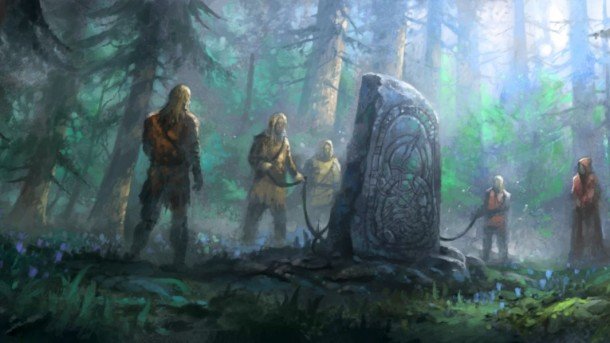
The first developer diary for the upcoming Crusader Kings II: The Old Gods expansion has been released. The Old Gods, set for Q2 2013, will finally add playable pagans to CK2. A new start date of 867 A.D. is also being added, as the pagans don't exactly start on stable footing in the default, 1066 scenario. I spent all morning pouring over the diary and the new screenshots and reading between the lines. What follows is every possible tidbit of information I was able to extract.
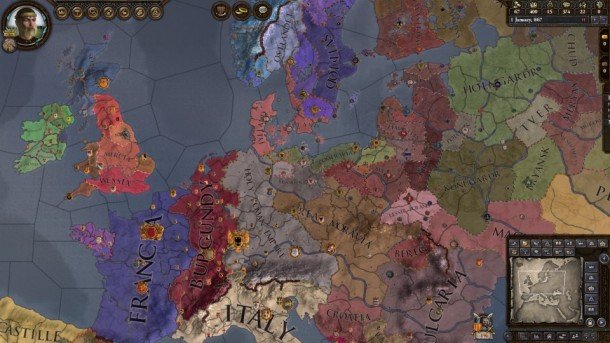
We've got confirmation of a few things we already knew from around the time of the announcement: The Carolignian Empire is divided among the grandsons of Charlemagne as the HRE, Italy, Francia, and Burgundy (historically, the last should be called Lotharingia). Almost everything North and East of that is divided into chiefdoms and petty kingdoms. England has yet to come into being, with Wessex, East Anglia, Mercia, Northumbria, and Viking-held Jorvik creating a divided and hotly-contested realm.
In what will one day be Russia, we can see Holmgarðr and Kónungarðr, the newly-formed Norse realms of Rurik. It's interesting that they have chosen to divide this land between two rulers. We already know about Rurik in Holmgard, but who his independent, Norse neighbor in Kiev might be, I couldn't say.
Scandinavia is also, appropriately, quite broken. Other than the petty kingdoms of Jylland, Sælland, Ostlandet, and Sviþjód (the Old Norse name for Sweden), it mostly seems to be divided between single-province chieftains or jarls. It will be interesting to see which among them can forge kingdoms of their own.
Now, here's where I got really excited…
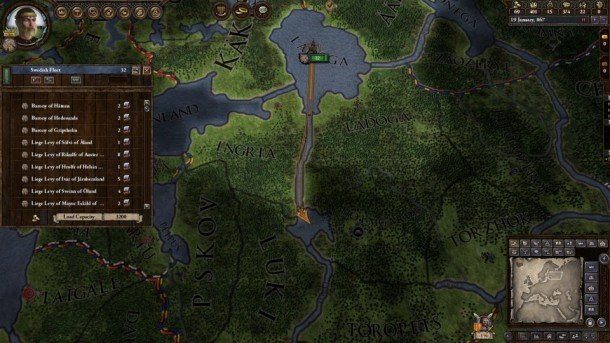
Traversable rivers! One of the greatest advantages of the Viking longship, historically, was its shallow draft—you could load it full of weapons, shields, burly Norsemen, and whatever plunder and slaves they gained on a raid, and it would still sit high enough in the water to glide right over shallow riverbeds and the like. Adding the ability to sail up and downriver means that those Franks in Paris can't sleep soundly, safe from Viking raids in their inland capital—as the Seine River acts as Pillager Highway 1. In a response on the official forums, the devs also confirmed the existence of portages: strips of land between two rivers over which boats can be carried, and re-deployed. The Vikings were known to make extensive use of these, particularly in reaching Eastern destinations.
There also seems to be a vertical bar at the bottom of the fleet card with an icon depicting gold coins next to it. This probably represents how much plunder your raiders can carry back.
The biggest gaming news, reviews and hardware deals
Keep up to date with the most important stories and the best deals, as picked by the PC Gamer team.
But Viking longboats were unique in this capacity. Surely they wouldn't let just any ship traverse Europe's rivers?
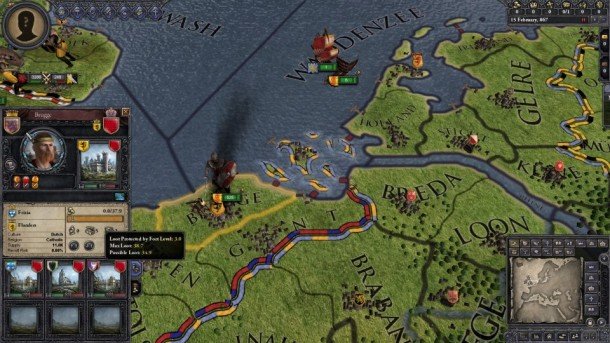
The answer, from what I can tell, is that this will not be the case. As you can see in this screenshot, there are two different ships, both under control of the player (the unit counter is green), with different models, sitting side-by-side. This isn't a confirmation, but it certainly seems like Old Gods will be adding a second ship type. Previously, in Crusader Kings, a ship was just a ship. If this is the case, the question is raised: Who will have access to river-capable ships? Surely the Norse will. Could this be tied into the new, more hands-on technology system we've heard murmurings about?
Also, take a look at the province card. We've got stats for “Loot Protected by Fort Level,” “Max Loot,” and “Possible Loot.” So it seems you'll be able to protect more of your gold from raiders by building up the defenses in your provinces. The interesting thing will be: where does this gold come from? Is it a proportion of the amount in the liege's treasury? That would seem to suggest that you could pre-empt a raid by spending all of your money, defensively. It's technically possible that a raid could take a set amount no matter what, potentially putting you in debt. A third possibility is that the defending liege doesn't actually lose any gold when a raid happens—his incentive to stopping it is just to keep the raiders from generating money and prestige.
I'm also curious to see whether or not raiding will use the regular warscore system, or simply allow you to declare a raid, take your money, and leave. There seems to be a little icon of a crossed torch and axe on some troops and fleets. It could be that these are a new "raider" unit type, separate from the normal armies and fleets. This would also explain the different ship types: One is a raiding fleet that can traverse rivers, and the other is made up of the traditional transports, which can only sail the seas.
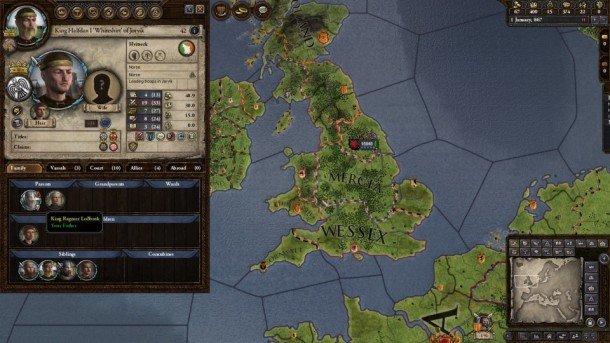
The dev diary details that “Playing a pagan chieftain is at least as different as playing a Muslim. Not only that, there are significant differences between the various heathen religions.” We had already heard that Norse leaders will begin to lose Prestige if they remain at peace for too long—meaning that if you want to one day give up a strategy focused on raid and conquest, you'll either have to convert, or have enough positive Prestige modifiers to offset this. What we didn't know is the other side of this coin: Unlike all current rulers in CK2, the Norse will not take penalties from their vassals for having troop levies raised.
The devs had also previously teased defensive bonuses for religions like the Romuva in the Baltic, who historically resisted Christianity the longest of any of the European, non-Abrahamic faiths. The diary mentions that they will receive larger garrisons in their homeland, and can be “reformed” to better resist conversion. Whether this reform simply refers to smart, player-driven gameplay, or a more discrete, new system altogether, we can't yet be sure. It would be very interesting to see a mechanic for centralizing and appointing a religious head for your pagan faith. It's not remotely historical, but neither is Venice conquering Arabia under an Ethiopian-born warlord. In CK2, stranger things have happened.
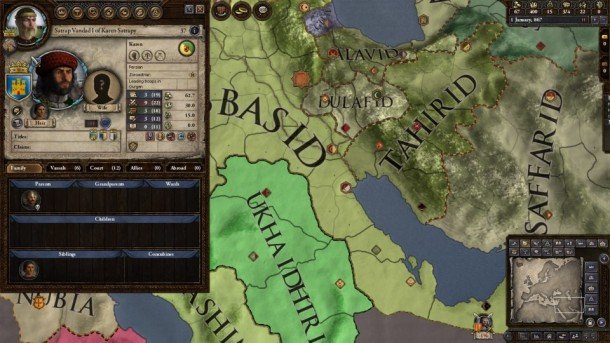
Lastly, let's take a look at the character sheets and the interface. One thing that's conspicuous by its absence is any kind of unique player resource, like Muslim decadence. Piety is still a factor, but it seems the rumored “Viking points” didn't make the cut. Both Norse and Zoroastrian characters seem to have a space for Concubines. We'll have to wait and see how the children of these concubines interact with the current system for bastards, since most pagans weren't as uptight about that kind of thing as Christians were. It also brings up the issue of what happens to these mistresses if a pagan character converts to a strongly monogamous religion.
There's also that little asterisk button underneath the spouse portrait. The forums seem to suggest that this is a way to mark a character as special interest, helping you keep an eye on them through notifications in your message log, without fiddling around in context menus. That's a very welcome addition, as I played for about 200 hours before figuring out how to do this.
Check out the official forum thread for more, including revelations about Iceland (it will be colonized, even though there were actually no humans there in 867—the engine doesn't currently support uninhabited provinces that can later become inhabited), the Magyars, and the Slavic-Norse conflict in Russia. Paradox dev diaries tend to roll out roughly weekly, so check back for more from the PC Gamer Viking Analysis Desk in a quarter moon's turn.
Len Hafer is a freelancer and lifelong PC gamer with a specialty in strategy, RPGs, horror, and survival games. A chance encounter with Warcraft 2: Tides of Darkness changed her life forever. Today, her favorites include the grand strategy games from Paradox Interactive like Crusader Kings and Europa Universalis, and thought-provoking, story-rich RPGs like Persona 5 and Disco Elysium. She also loves history, hiking in the mountains of Colorado, and heavy metal music.

